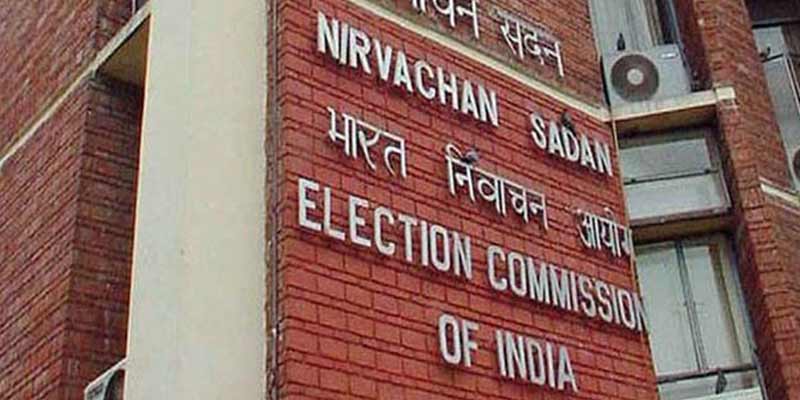- India
- Jan 15
EC relaxes norms for registration of new parties in 5 states
The Election Commission announced reducing the notice period for registration of new political parties in the five poll-going states from 30 days to 7 days, keeping in view difficulties caused by COVID-19-induced curbs.
EC announced the schedule for assembly polls in Uttar Pradesh, Uttarakhand, Goa, Punjab and Manipur on January 8.
Currently, party seeking registration with the Election Commission has to submit an application within a period of 30 days following the date of its formation as per guidelines prescribed by the EC in exercise of the powers conferred by Article 324 of the Constitution of India and Section 29A of the Representation of the People Act, 1951. The applicant is asked to publish the party’s proposed name in two national dailies and two local dailies on two days. Objections, if any, with regard to the proposed registration of the party have to be submitted within 30 days from the publication of the notice.
After considering all aspects, the Commission has given a relaxation and has reduced the notice period from 30 days to seven days for the parties who have published their public notice on or before January 8.
EC also noted that during the Assembly elections in Bihar, Assam, Kerala, Puducherry, Tamil Nadu and West Bengal, it had relaxed the notice period in view of the ongoing pandemic.
Recognition for political parties
It is not necessary for every association to get registered by the Election Commission. Only an association or body of individual citizens of India calling itself a political party and intending to avail itself of the provisions of Part IVA of the Representation of the People Act, 1951, (relating to registration of political parties) is required to get itself registered with the Election Commission of India.
What are the benefits of registration with the EC?
The candidates set up by a political party registered with the Election Commission of India will get preference in the matter of allotment of free symbols vis-à-vis independent candidates.
Registered political parties, in course of time, can get recognition as state party or national party subject to the fulfillment of the conditions prescribed by the Commission in the Election Symbols (Reservation and Allotment) Order, 1968, as amended from time to time.
If a party is recognised as a state party, it is entitled for exclusive allotment of its reserved symbol to the candidates set up by it in the state of states in which it is so recognised.
If a party is recognised as a national party, it is entitled for exclusive allotment of its reserved symbol to the candidates set up by it throughout India.
Recognised state and national parties need only one proposer for filing the nomination and are also entitled for two sets of electoral rolls free of cost and broadcast/telecast facilities over Akashvani/Doordarshan during general elections.
Political parties are entitled to nominate “star campaigners” during General Elections. A recognised national or state party can have a maximum of 40 “star campaigners” and a registered unrecognised party can nominate a maximum of 20 “star campaigners”. The travel expenses of “star campaigners” are not to be accounted for in the election expense accounts of candidates of their party.
Criteria for recognition as a state party
A political party shall be treated as a recognised political party in a state, if and only if either the conditions specified in Clause (A) are, or the condition specified in Clause (B) is fulfilled by that party.
A) That such party has been engaged in political activity for a continuous period of five years; and has, at the last general election in that state to the Lok Sabha, or, as the case may be, to the Legislative Assembly, returned either:
i) At least one member to the Lok Sabha for every 25 members of that House or any fraction of that number from that state.
Or
ii) At least one member to the Legislative Assembly of that state for every 30 members of that Assembly or any fraction of that number.
(B) That the total number of valid votes polled by all the contesting candidates set up by such party at the last general election is not less than six per cent of the total number of valid votes polled by all the contesting candidates.
Criteria for recognition as a national party
If a political party is treated as a recognised political party in four or more states, it shall be known as a national party throughout the country, but only so long as that political party continues to fulfill thereafter the conditions for recognition in four or more states on the results of any subsequent general election either to Lok Sabha or to the Legislative Assembly of any state.
Manorama Yearbook app is now available on Google Play Store and iOS App Store

